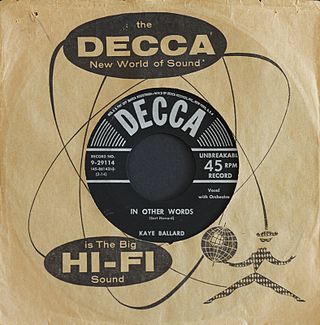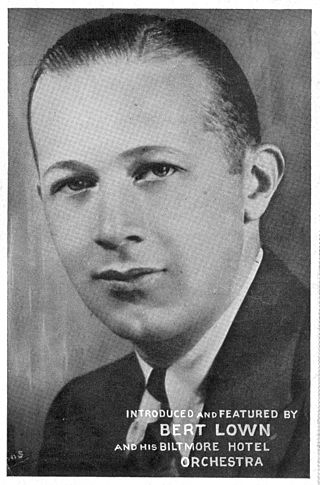Related Research Articles

Stanley Allison Rogers was a Canadian folk musician and songwriter.

The American Society of Composers, Authors, and Publishers (ASCAP) is an American not-for-profit performance-rights organization (PRO) that collectively licenses the public performance rights of its members' musical works to venues, broadcasters, and digital streaming services.

"Fly Me to the Moon", originally titled "In Other Words", is a song written in 1954 by Bart Howard. The first recording of the song was made in 1954 by Kaye Ballard. Frank Sinatra's 1964 version was closely associated with the Apollo missions to the Moon.
"The Turning Wheel" is a novelette by American science fiction writer Philip K. Dick. It was published in Science Fiction Stories No. 2, 1954.

"Ramblin' Rose" is a 1962 popular torch song written by brothers Noel Sherman (words) and Joe Sherman (music) and popularized by Nat King Cole. The recording by Nat King Cole reached No. 2 on the Billboard Hot 100 chart in 1962.

The Copyright Act of 1909 was a landmark statute in United States statutory copyright law. It went into effect on July 1, 1909. The 1909 Act was repealed and superseded by the Copyright Act of 1976, which went into effect on January 1, 1978; but some of 1909 Act's provisions continue to apply to copyrighted works created before 1978. It allowed for works to be copyrighted for a period of 28 years from the date of publication and extended the renewal term from 14 years to 28 years, for a maximum of 56 years.

Bert Lown was an American violinist, orchestra leader, and songwriter.
United States copyright registrations, renewals, and other catalog entries since 1978 are published online at the United States Copyright Office website. Entries prior to 1978 are not published in the online catalog. Copyright registrations and renewals after 1890 were formerly published in semi-annual softcover catalogs called The Catalog of Copyright Entries (CCE) or Copyright Catalog, or were published in microfiche.
"The Cattle Call" is a song written and recorded in 1934 by American songwriter and musician Tex Owens. The melody was adapted from Bruno Rudzinksi's 1928 recording "Pawel Walc". It later became a signature song for Eddy Arnold. Members of the Western Writers of America chose it as one of the Top 100 Western songs of all time.
Copyright renewal is a copyright formality through which an initial term of copyright protection for a work can be extended for a second term. Once the term of copyright protection has ended, the copyrighted work enters the public domain, and can be freely reproduced and incorporated into new works.
Noel Sherman was an American lyricist and nightclub producer. Among the standards that Sherman composed, often with his brother Joe Sherman, are "Ramblin' Rose", "Graduation Day", "Eso Beso" (no), "To the Ends of the Earth", and "Juke Box Baby".
William Weldon Higgins was an American vaudeville entertainer, comedian, singer and songwriter — critically acclaimed, and is historically chronicled, as one of the most popular stage comedians of the 1920s. Langston Hughes named him as one of the "Golden Dozen" black comedians. On various recordings of the 1920s, Higgins used the pseudonym Jazz Caspar(akaCasper).
Jack "Bones" O'Brien(néJohn Roger O'Brien; 16 October 1903 – 12 October 1982) was an American jazz pianist and songwriter from Allentown, Pennsylvania. Notably, O'Brien was pianist, composer, and arranger with the Ted Weems orchestra from 1925 through 1941.
"My Greatest Mistake" is a popular song written in 1940 by Jack Fulton and Jack "Bones" O'Brien.
Robert Edward Lin Nelson was a Hawaiian songwriter, composer, pianist, and singer. He is best known for his most popular songs, "Hanalei Moon" and "Maui Waltz". He was also a staunch defender of the copyrights and royalties of Hawaiian songwriters and composers, and served on advisory boards at ASCAP for two decades. In 2013 he received the Lifetime Achievement Award from the Hawaii Academy of Recording Arts.
Helen Searles Westbrook was an American composer and organist who appeared with Chicago Symphony.
Florence Turner-Maley was an American composer, singer, and teacher.
References
- 1 2 "I'd Start a Battle to Get Back to Seattle", Museum of History & Industry, Seattle. Retrieved March 7, 2020
- ↑ Ancestry.com. U.S. WWII Draft Cards Young Men, 1940-1947 . Lehi, UT, USA: Ancestry.com Operations, Inc., 2011
- 1 2 3 Stern, Arthur “Art”, Mar-Ken.org. Retrieved January 14, 2016
- ↑ "Arthur Hamilton". Movies & TV Dept. The New York Times. Archived from the original on January 30, 2013.
- 1 2 3 4 "Arthur Hamilton". IMDb.com.
- 1 2 "Arthur Hamilton - Gemini Press". Tritone-tenuto.com.
- ↑ Letter from Arthur Hamilton, TheMusicEdge.com, archived. Retrieved January 14, 2016
- ↑ "How London Found Path to "River"", Billboard, 11 November 2000, p.45
- 1 2 "Alan Ross Fleishman site: Arthur Hamilton". Web.mac.com. Archived from the original on January 24, 2012. Retrieved September 8, 2010.
- ↑ John Berlau, "Crying a River for Years", The Wall Street Journal, December 15, 2010. Retrieved January 14, 2016
- ↑ Search results for "Arthur Hamilton" & "Jurmann". US Copyright Office. Retrieved August 2, 2013.
- ↑ Renewal registration for "Never Tell Me". US Copyright Office. Retrieved August 2, 2013.
- ↑ Ace Repertory Database Archived March 6, 2013, at the Wayback Machine . ASCAP. Retrieved August 2, 2013. (Search for title "Holding It Together" within database.)
- ↑ Renewal registration for "I Never Told You". US Copyright Office. Retrieved August 2, 2013.
- ↑ Registration for sound recording of "Time" (lyric version of "Love Theme from 'Gable and Lombard'"). US Copyright Office. Retrieved August 2, 2013.
- ↑ Renewal registration for "Some Days Seemed So Beautiful". US Copyright Office. Retrieved August 2, 2013.
- ↑ Ace Repertory Database Archived March 6, 2013, at the Wayback Machine . ASCAP. Retrieved August 2, 2013. (Search for title "Only a Dream Away" within database, and scroll to title no. 3.)
- ↑ Search results for "Arthur Hamilton" & "Ortolani". US Copyright Office. Retrieved August 2, 2013.
- ↑ Search results for "Arthur Hamilton" & "Terry Trotter". US Copyright Office. Retrieved August 2, 2013.
- ↑ Search results for "Arthur Hamilton" & "Lori Barth". US Copyright Office. Retrieved August 2, 2013.
- ↑ Registration for "The Best I Ever Was". US Copyright Office. Retrieved August 2, 2013.
- ↑ Sheet music for "You Tell Yourself". Photobucket. Retrieved August 2, 2013
- ↑ Guide to the Dave Grusin Collection (Box 1, fd. 19) Archived January 29, 2016, at the Wayback Machine . University of Colorado at Boulder. Retrieved August 2, 2013. (Scroll all the way to the bottom.)
- ↑ Search results for "Arthur Hamilton" & "Walter Scharf". US Copyright Office. Retrieved August 2, 2013.
- ↑ Search results for "Arthur Hamilton" & "Joe Harnell". US Copyright Office. Retrieved August 2, 2013.
- ↑ Search results for "Arthur Hamilton" "Leroy Holmes". US Copyright Office. Retrieved August 2, 2013.
- ↑ Search results for "Arthur Hamilton" & "Harriet Schock". US Copyright Office. Retrieved August 2, 2013.
- ↑ Search results for "Arthur Hamilton" & "Ron Anthony". US Copyright Office. Retrieved August 2, 2013.
- ↑ Search results for "Arthur Hamilton" & "Patrick Williams". US Copyright Office. Retrieved August 2, 2013.
- ↑ "About The ASCAP Foundation". Retrieved 7 March 2020